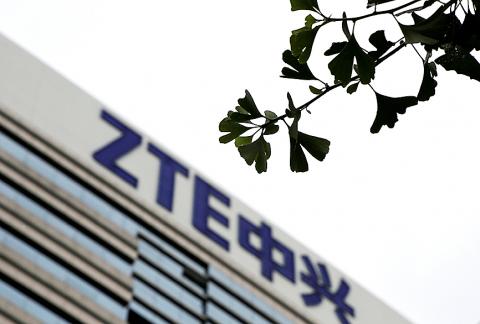ZTE Corp’s (中興通訊) shares surged after it inked an agreement with the US to allow the company to resume doing business with US suppliers, meeting a key Chinese government demand.
The Chinese telecom gear maker signed an escrow agreement with the US Department of Commerce, and a ban on US technology purchases is to be lifted as soon as ZTE deposits US$400 million, the department said in an e-mailed statement on Wednesday.
A person familiar with the matter said the escrow payment should be completed within a day.

Photo: Reuters
ZTE last month took a major step forward in meeting the White House’s conditions by sacking its entire board and appointing a new chairman.
Its new management faces the challenge of rebuilding trust with phone companies and corporate customers, but the company is said to be facing at least US$3 billion in total losses from a months-long moratorium that choked off the chips and other components needed to make its networking gear and smartphones.
Shares in ZTE, which is operating on a temporary waiver that expires on Aug. 1, soared as much as 24 percent in Hong Kong. Its Shenzhen-listed stock rose by its 10 percent daily limit.
“As ZTE is finally near the end of the tunnel, we believe its current stock price incorporates an overly pessimistic view on the settlement,” Jefferies Group LLC analysts Edison Lee and Timothy Chau wrote in a note yesterday. “Assuming ZTE will be able to get back into business next week, we believe the market will start focusing on its earnings prospects.”
ZTE representatives had on Monday met with department officials to discuss a path forward for the deal, people familiar with the meeting said on condition of anonymity.
“Once the monitor is selected and brought on board, the three-pronged compliance regime — the new 10-year suspended denial order, the US$400 million escrow and the monitor — will be in place,” the department said in the statement.
A bipartisan group of US lawmakers remains concerned about ZTE’s threat to US national security and is pushing for legislation aimed at restoring harsher penalties.
Wednesday marks the start of negotiations on legislation that would try to balance concerns that ZTE presents a security risk with efforts to get the company back into business.

The CIA has a message for Chinese government officials worried about their place in Chinese President Xi Jinping’s (習近平) government: Come work with us. The agency released two Mandarin-language videos on social media on Thursday inviting disgruntled officials to contact the CIA. The recruitment videos posted on YouTube and X racked up more than 5 million views combined in their first day. The outreach comes as CIA Director John Ratcliffe has vowed to boost the agency’s use of intelligence from human sources and its focus on China, which has recently targeted US officials with its own espionage operations. The videos are “aimed at

STEADFAST FRIEND: The bills encourage increased Taiwan-US engagement and address China’s distortion of UN Resolution 2758 to isolate Taiwan internationally The Presidential Office yesterday thanked the US House of Representatives for unanimously passing two Taiwan-related bills highlighting its solid support for Taiwan’s democracy and global participation, and for deepening bilateral relations. One of the bills, the Taiwan Assurance Implementation Act, requires the US Department of State to periodically review its guidelines for engagement with Taiwan, and report to the US Congress on the guidelines and plans to lift self-imposed limitations on US-Taiwan engagement. The other bill is the Taiwan International Solidarity Act, which clarifies that UN Resolution 2758 does not address the issue of the representation of Taiwan or its people in

US Indo-Pacific Commander Admiral Samuel Paparo on Friday expressed concern over the rate at which China is diversifying its military exercises, the Financial Times (FT) reported on Saturday. “The rates of change on the depth and breadth of their exercises is the one non-linear effect that I’ve seen in the last year that wakes me up at night or keeps me up at night,” Paparo was quoted by FT as saying while attending the annual Sedona Forum at the McCain Institute in Arizona. Paparo also expressed concern over the speed with which China was expanding its military. While the US

SHIFT: Taiwan’s better-than-expected first-quarter GDP and signs of weakness in the US have driven global capital back to emerging markets, the central bank head said The central bank yesterday blamed market speculation for the steep rise in the local currency, and urged exporters and financial institutions to stay calm and stop panic sell-offs to avoid hurting their own profitability. The nation’s top monetary policymaker said that it would step in, if necessary, to maintain order and stability in the foreign exchange market. The remarks came as the NT dollar yesterday closed up NT$0.919 to NT$30.145 against the US dollar in Taipei trading, after rising as high as NT$29.59 in intraday trading. The local currency has surged 5.85 percent against the greenback over the past two sessions, central